Drone attack reported on US base in Iraq
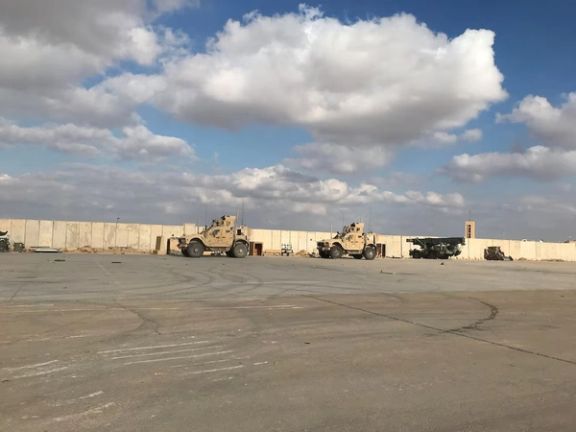
Two armed drones on Tuesday targeted Iraq's Ain al-Asad airbase, which hosts US forces and other international forces in western Iraq, two Iraqi military sources told Reuters.

Two armed drones on Tuesday targeted Iraq's Ain al-Asad airbase, which hosts US forces and other international forces in western Iraq, two Iraqi military sources told Reuters.
It was the second attack against US forces in Iraq since early February when Iranian-backed groups in Iraq stopped their attacks against US troops. In January, the United States launched retaliatory air strikes against Iran-backed militias who were targeting its forces in Iraq and Syria. Since then, only a few incidents had been reported.
An Iraqi military official said defense systems downed one drone near the base perimeter.
In April, two drones were shot down near Ain al-Asad base, according to a US official.
No casualties have been reported, said the sources.
The latest reported attack comes after Masoud Pezeshkian, who is presented as a “moderate” won the presidential election in Iran, raising some expectations in the West that he might restart nuclear talks. However, the United States has dismissed such suggestions, giving little credence to major changes under the new president.
Iraqi army stepped up patrolling the areas around the base to prevent possible further attacks, said an Iraqi army official.
The attack came less than a week before an expected visit by a high-level Iraqi military delegation to Washington to continue talks on ending the US -led military coalition in the country.
Washington and Baghdad in January initiated talks to reassess the draw-down of the US-led coalition in Iraq, formed in 2014 to help fight Islamic State after the extremist Sunni Muslim militant group overran large parts of the country.
A US official, speaking on condition of anonymity, said a projectile appears to have targeted the base, but without causing casualties.
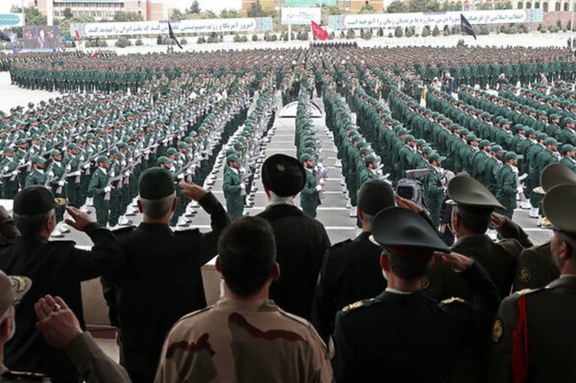
A new report commissioned by the Hague Initiative refutes the EU foreign policy chief's argument for not listing the Islamic Revolutionary Guard Corps (IRGC) on the EU's terror list.
Pieter Hoogendoorn, the author behind the new report, blasted EU foreign policy chief Josep Borrell, saying he's making 'excuses' when it comes to taking action against the IRGC.
Borrell told reporters on Jan. 23 before a meeting of foreign ministers in Brussels, that there are legal reasons why the EU can't list the organization as a terror entity.
"It is something that cannot be decided without a court, a court decision first," said Borell according to Reuters.
The European Parliament called on the EU to list the IRGC as a terrorist entity in January, blaming it for the harsh repression of domestic protests and the supply of drones to Russia for use in its war against Ukraine.
"Discussions on the IRGC continue among the member states. These discussions are internal and confidential therefore we cannot comment on them in public. Just to recall, the IRGC as entity and number of their commanders and members are already sanctioned under various EU sanctions regimes," said a Lead Spokesperson for Foreign Affairs and Security Policy at the European Commission.
The argument that the EU cannot list the IRGC as terrorists until an EU court has determined that they are, is baseless according to Hoogendoorn.
""This is false. This is misleading. The European Court of Justice has confirmed that in order to put a person, a group or an organization on the EU terror list that it has to have a competent authority starting an investigation into the matter, or to put the IRGC on the list in their country," explained Hoogendoorn.
Hoogendoorn said the “confirmation” follows from the case-law of the European Court of Justice (ECJ) in its interpretation of the so-called Common Position.
Council Common Position (CP 931) states that any person, group, or entity involved in terrorist acts can be designated “when a decision has been taken by a competent authority in respect of the person, group or entity concerned.” That decision could be instigation of an investigation or prosecution for either a terrorist act or even just an attempt to carry out such an act. It could also be merely a "condemnation" without conviction.
Despite Borrell’s statement, CP 931 also states that enlisting a terrorist organization can be made on information from non EU member states.
That means a court decision is not a necessary condition for designation.
The report points out that the evidence of Iran attempting such acts is already public knowledge.
Criminal gangs operating on the behest of the Islamic Republic of Iran, for example, are behind a string of terror attacks on Israeli embassies in Europe since October 7, according to Israeli and Swedish Intelligence agencies.
The Trump administration sanctioned the IRGC as a foreign terrorist organization in 2019. Canada followed suit in June of this year after immense pressure from the Iranian-Canadian community and family members of victims of PS752.
In early July, the EU reportedly accepted a request from Germany to consider designating IRGC as a terrorist entity. Germany is not the only European country pushing for the listing of the Revolutionary Guard.
Since Germany is one of the EU states that has already taken the lead on this initiative, there is no need for an EU court to determine the IRGC as a terror organization.
Once it is agreed between European members states to label the IRGC as terrorists, then the European Council is legally obliged to implement the consequences of having them on the EU terror list.
The executive director of UN watch, Hillel Neuer, said this latest report provides more evidence that there is no legal reason not for the EU not to purse enlisting the IRGC a terror organization.
"This latest report only underscores what we have known for a long time. EU high commissioner Josep Borrell has no more excuses, " said Neuer.
"The evidence is clear to anyone who has eyes and ears. The IRGC is a terrorist organization that continues to carry out terrorist attacks around the world."
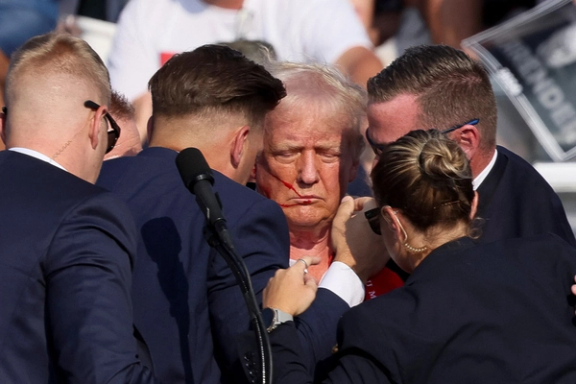
US authorities have intensified security measures around former President Donald Trump after receiving intelligence reports of an Iranian plot to assassinate him, a CNN report said, although no links have been established between the plot and a recent shooting at a Trump rally.
Iran has repeatedly threatened to avenge the death of Qassem Soleimani, the commander of the Islamic Revolutionary Guard Corps (IRGC), who was killed in January 2020 on orders from then-President Trump.
CNN reported on Tuesday that recent intelligence from a human source reveals Iran was planning to assassinate Trump, leading to enhanced security measures by the Secret Service.
Despite these precautions, a shooting incident occurred at the Trump rally in Butler, Pennsylvania, where a 20-year-old man, Thomas Matthew Crooks, accessed a nearby rooftop and fired shots, injuring the former president. Authorities have told CNN that there is no known connection between Crooks and the Iranian plot.
Iran’s permanent mission to the UN immediately denied CNN's report, saying, “These accusations are unsubstantiated and malicious."
A US national security official confirmed that the Secret Service and the Trump campaign were informed of the Iranian threat prior to the rally. "Secret Service learned of the increased threat from this threat stream," the official told CNN. "The National Security Council directly contacted USSS at a senior level to be absolutely sure they continued to track the latest reporting."
Later on Tuesday, unnamed US officials told Politico that "there may be more attempts on Trump’s life in the coming weeks."
"The US intelligence community has received an increasing amount of evidence to suggest that Iran is actively working on plots to kill former President Donald Trump, potentially in the lead up to the election in November," the Politico report said.
Trump’s secretary of state Mike Pompeo was also among the targets of the Iranian assassination plot, CNN reported citing a federal law enforcement source and a source close to Pompeo.
"Tehran's terror threat against Trump is like a pilot-light: always on in the background and can be scaled up in intensity at a time of their own choosing," Behnam Ben Taleblu, a Senior Fellow at Foundation for Defense of Democracies (FDD), told Iran International.
“Domestic divisions or not, Iranian officials continue to believe that blood will only wash away blood. That's why they have not shied away from officially stating that the policy of the regime remains the killing of Trump-era national security officials whom they believe were involved in the killing of Qassem Soleimani in Iraq in January 2020," he said.
In August 2022, the US Justice Department charged an IRGC member for allegedly planning to assassinate John Bolton, the Trump administration’s national security adviser, in retaliation for Soleimani’s assassination. Bolton has been enjoying Secret Service detail since then.
Robert O’Brien, another national security adviser in the Trump administration, previously had a US government security detail due to threats from Iran, similar to Pompeo and other former Trump officials. However, that protection was withdrawn last summer, sources revealed to CNN. O’Brien is now funding his own private security, according to sources.
Iran's assassination threat against the two former national security advisers has been countered by a $12m-a-year Secret Service operation, official papers showed in February.
“Make no mistake, lapses in security can and will permit Iran-backed plots to succeed," Ben Taleblu told Iran International. "While fortunately many have been discovered or thwarted over the years, the rise in Iran-backed terror and kidnapping attempts usings proxies and trans-national criminal syndicates means that Tehran believes quantity has a quality of its own and is waiting for a mistake.”
US law enforcement also protects Iranian dissidents and journalists in America due to credible threats from Iran.
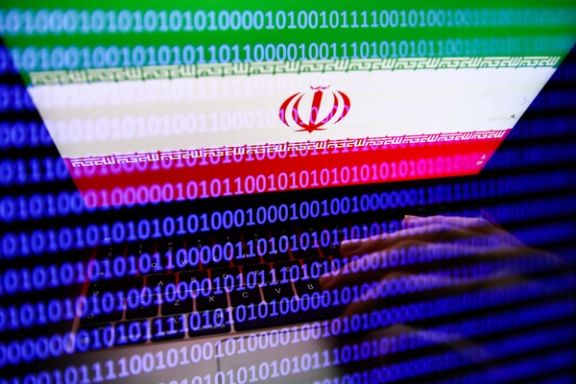
On Tuesday, Israel charged one man and detained two others for espionage on behalf of Iran, according to the Shin Bet security service.
The suspect, identified as Elimelech Stern, a 21-year-old from Beit Shemesh, a religious area outside Jerusalem ,was approached via the Telegram messaging app by an individual using the alias "Anna Elena."
He had been solicited to commit murder and arson. According to The Jerusalem Post, Stern was also instructed to perform various tasks, such as posting notices in Tel Aviv, depositing money at specific locations in Jerusalem and Tel Aviv, and delivering packages containing menacing items, including a severed animal head or a doll with a knife and a threatening note.
Stern agreed to execute the tasks other than murder and starting a forest fire.
The investigation revealed that Iranian intelligence continues to use social media to contact and recruit individuals, employing fictitious profiles to conceal their identities.
Platforms such as Instagram, Telegram, WhatsApp, Facebook, and X have all been utilized for these covert approaches, which are conducted in multiple languages, including Hebrew and English.
In recent months, Israeli media has reported the identification and monitoring of numerous fake profiles operated by Iranian security agencies. Extensive intelligence has been gathered on the entities orchestrating these operations, revealing their attempts to recruit individuals through social media and job listing websites.
The incident follows a similar case last year in which two Israelis were acquitted of espionage charges for Iran while a third was convicted of a related offense. The case initially involved serious accusations against five individuals with personal or familial connections to Iran.
Last year, Iran used a group of women trained to speak Hebrew to send sexually explicit images to Israeli soldiers in a bid to honey trap them and extort information.
Trained by the Islamic Revolutionary Guards Corps (IRGC), they contacted the soldiers over social media, sending them explicit videos and photos to gain information.
Iran has long been a staunch supporter of Hamas, which has been embroiled in its most prolonged conflict with Israel since seizing control of Gaza in a violent coup in 2007.
Tehran has consistently supplied the militant group with financial assistance, weaponry, and training. This support includes the provision of advanced rockets, sophisticated military equipment, and technical expertise, all aimed at bolstering Hamas's capabilities in its ongoing conflict with its longstanding adversary.
On April 13, Iran itself launched missile and drone strikes on Israel, following an alleged Israeli airstrike in Damascus that resulted in the deaths of several senior officers of the Islamic Revolutionary Guard Corps.
Although Iran’s strike was largely neutralized with the assistance of the United States and other allies, it represented a significant escalation in the shadow war between the two archenemies.
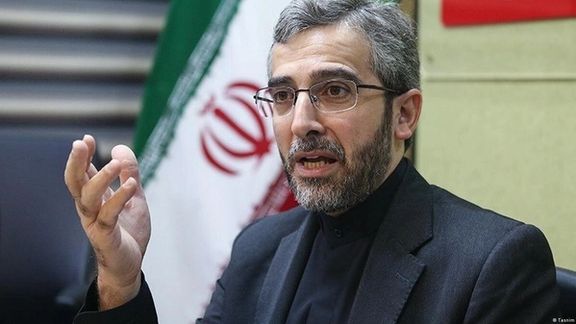
Tehran remains open to resuming negotiations with Washington on restoring their participation in a nuclear agreement, Iran's acting foreign minister told Newsweek magazine in an interview published on Tuesday.
Ali Bagheri-Kani's remarks come as he prepares to address the United Nations Security Council in New York on issues not directly related to Iran.
The United States under President Donald Trump withdrew from in 2018 from the nuclear accord between Iran and six world powers which restricted Tehran's nuclear program.
Indirect talks between the US and Tehran to revive the deal during the Biden administration have stalled. Iran is still part of the agreement but it has decreased its commitments due to US sanctions imposed on it.
Newsweek said: "On the foreign policy front, he (Bagheri Kani) said that Tehran remained open to resuming negotiations with Washington toward restoring mutual participation in a nuclear deal."
However, Iran also intended to foster its deepening ties with China, Russia and neighboring nations, it quoted him as saying. Iran will also call for greater action against Israel in view of the Gaza war, he said.
The Biden administration said last week the United States was not ready to resume nuclear talks with Iran under its new president. With the election of Masoud Pezeshkian earlier in July, some speculated that Tehran intended to hold more serious talks with Washington, but so far the new president has signaled the continuation of Iran's regional policies of projecting power.
Bagheri-Kani became the acting foreign minister after foreign minister Hossein Amir-Abdollahian died in a helicopter crash along with Iran's president Ebrahim Raisi in May. Some interpreted his decision to travel to New York to attend the Security Council meeting as a possible attempt to pursue the issue of more talks. Iran is not a member of the Council at the present time.
Masoud Pezeshkian was then elected as president in a snap election. During his campaign he said he will promote a pragmatic foreign policy and ease tensions with the powers involved in the 2015 nuclear pact. However, after his election he exchanged messages with Iran's militant proxy forces across the region, re-affirming Tehran's support for their anti-Israel and anti-West stance.
He has so far been mostly silent on the nuclear issue. Iran has enriched enough uranium to be able to produce at least three bombs.
Asked about Iran's ability to make nuclear weapons and if the country may change its decision to develop them, he reiterated that Iran is an "accountable and responsible" member of the International Atomic Energy Agency and signatory to the NPT [Treaty on the Non-Proliferation of Nuclear Weapons].
"Iran will make use of all its potentials and capacities within the framework of the NPT and the Safeguards Agreement in order to expand its peaceful nuclear activities according to its national plans and programs," he added.
With reporting by Reuters
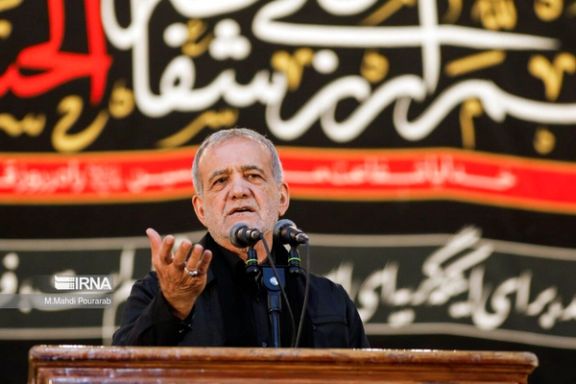
The Iranian president-elect, Masoud Pezeshkian, has sparked controversy by spending time attending religious ceremonies, while his critics decry his lack of political planning before taking office.
In the latest occurrence within a series of his participation in Muharram mourning rituals, Pezeshkian was photographed on Tuesday alongside Esmail Qaani, the commander of the IRGC Quds Force. This event took place at a highly revered site for Shia Muslims dedicated to their Twelfth Imam.
During the lunar month of Muharram, Shia Muslims observe mourning rituals to commemorate the death of Husayn (Hussain) ibn Ali, the grandson of Prophet Muhammad and the third Shia Imam.
Critics argue that amidst the nation's multifaceted challenges, Pezeshkian has not yet crafted a comprehensive agenda for his presidency or compiled a roster of prospective cabinet members, viewing his participation in these sessions as indicative of irresponsibility.
Akbar Ganji, a political commentator and former member of the Islamic Revolutionary Guard Corps (IRGC) residing abroad, voiced his criticism on X, stating: "Hopefully, in a few days, the mourning ceremonies will end. Otherwise, I worry that Pezeshkian might forget the presidency and go from one religious gathering to another, reciting elegies and performing eulogies."
Meanwhile, Pezeshkian has yet to hold a press conference, as his scheduled news event on the day of his election was abruptly cancelled. Media in Tehran reported at the time that the cancellation was due to a meeting with Supreme Leader Ali Khamenei.
Critics argue that while Pezeshkian has found ample time to attend religious ceremonies, he has yet to allocate time for a press conference, even after more than a week since his election.
Meanwhile different social groups voice their demands publicly, hoping to receive attention from the new chief executive. The care-taker government just announced that it will stop offering cheap US dollars for imports of more than 450 items, only focusing on essential food and medicines. This immediately raised the price of iPhones by about $250.
Reza Shafakhah, Chair of the Committee on the Rights of the Children of the National Union of Lawyers Associations, urged Pezeshkian to prioritize educating underserved children.
“Mr. Pezeshkian, once you have concluded your participation in mourning sessions, kindly direct your Ministry of Interior to identify children deprived of education per the Law on the Protection of Children and Adolescents. Moreover, please ensure collaboration with the Ministry of Education to facilitate their access to schooling, particularly as the school enrollment season approaches,” Shafakhah wrote.
The criticisms extended to ordinary citizens on social media as well. One user remarked, "Experts such as Zarif have told Pezeshkian, 'Since you have no capability to select ministers, spend these few days attending religious gatherings and mourning. We will assemble the cabinet for you...'"
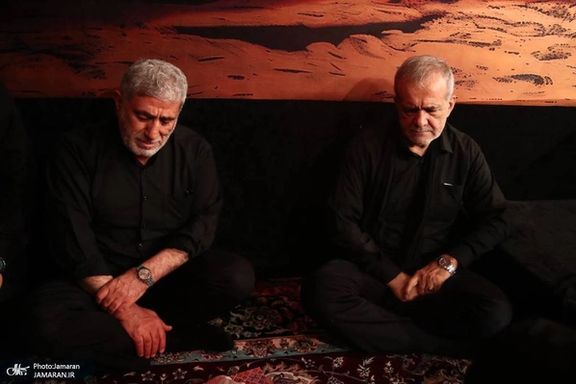
The user alluded to Pezeshkian appointing former Foreign Minister Mohammad Javad Zarif as the head of the Strategic Council for Transition, responsible for shortlisting candidates for ministerial and vice-presidential positions in the Pezeshkian administration. Thus far, Pezeshkian has not demonstrated any active involvement in the cabinet formation process.
Meanwhile, others defended Pezeshkian, stating that since he has not taken office as president, criticisms about his attendance at religious gatherings are unfounded. They also argue that attending these religious gatherings, predominantly held at night, does not imply a lack of responsibility or preclude his meaningful political work during the day.
"Dr. Pezeshkian has not officially assumed the presidency, so technically, he is not the president yet. Is it wrong for him to attend religious gatherings? Would it be acceptable if he went to a nightclub instead? Does a president or president-elect not have the right to eat, go to a mosque, or watch a football game?" a user wrote on X.
Some defend his actions by asserting his intrinsic religiosity and adherence to tradition, suggesting there is little beyond his religious convictions driving his behavior.
However, other defenders delve deeper, suggesting that Pezeshkian employs this strategy to reconcile the divide between hardliners and non-hardliners. Pezeshkian, elected as a reform-leaning candidate, secured victory in a runoff election against hardline opponents, indicating a narrower margin of support. Some contend that he aims to appeal to a broader population segment through these actions.
In these religious ceremonies, he is quoted as saying: "All individuals are human beings, not merely those who support us; even those who do not help us are part of humanity. We contend with ideological and factional differences; adherence to truth transcends such disputes."
A user wrote on X, “For now, let Pezeshkian be. He is tending to the deep wound inflicted upon his staunch supporters by his victory.”
Thus far, Pezeshkian has exemplified his pre-election pledge of unwavering obedience to the Supreme Leader's directives. Ali Khamenei places significant emphasis on these mourning rituals, particularly the Heyat, which refers to collective mourning groups or gatherings.
A Heyat constitutes a grassroots social movement within each neighborhood. Comprised of friends, relatives, neighbors, and individuals of all ages, these groups establish their facilities, known as Tekyehs, for conducting processions and ceremonies throughout Muharram.
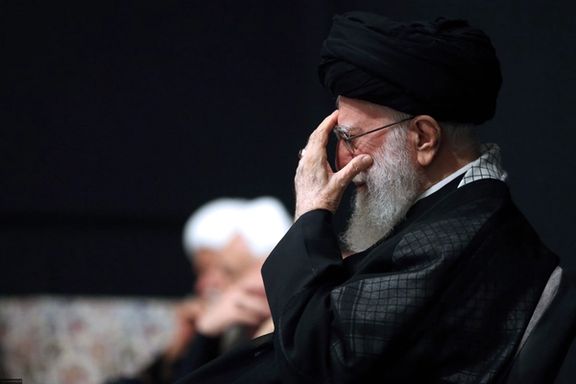
Khamenei also emphasizes the significance of "Maddahan" (singular "Madah"), religious singers or eulogists, who traditionally appeared prominently in mosques and during religious observances such as mourning ceremonies. In recent years, however, eulogists have gained increasing influence, expanding their role into the political sphere and frequently offering commentary on diverse topics, including enforcing hijab and societal norms.
Khamenei went as far as to define what these Maddahan do as a soft power for the Islamic Republic.
“The art of eulogizing and the entity known as the "Heyat" represents a crucial element of the soft power within Islamic society. Soft power wields greater influence and efficacy than hard power,” the Supreme Leader said in January.
“Why do the world's powerful nations, such as the United States, possessing nuclear arsenals and a plethora of advanced weaponry, nevertheless channel their most significant investments into arts, cinema, Hollywood, advertising, and similar domains?
“The rationale is that cinema embodies soft power; storytelling and filmmaking constitute soft power. These cultural mediums engender lasting influence.
“Conversely, hard power yields immediate but transient effects. Hard power entails, for instance, the United States occupying Afghanistan for two decades, expending billions, only to eventually retreat under the duress of widespread animosity.
“In contrast, soft power is epitomized by a seemingly minority group possessing profound spiritual influence, capable of captivating global attention,” he added.